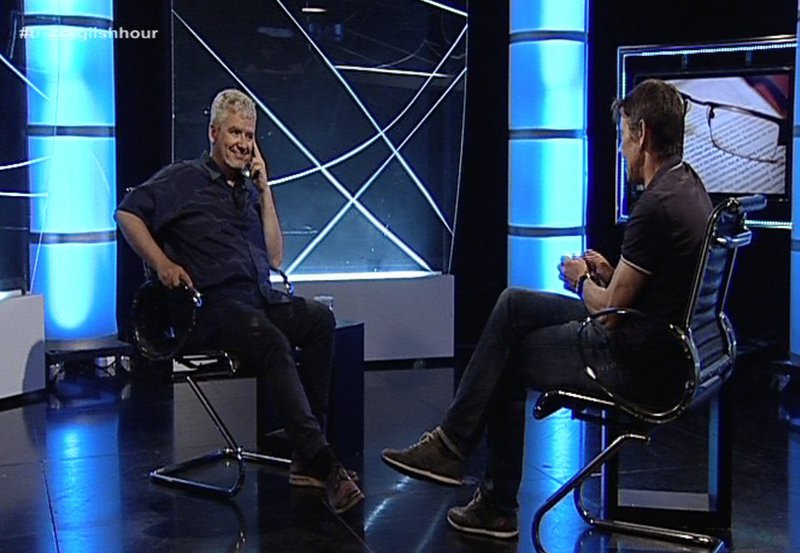Interview
The art of procrastination

Tell us about your book on time management, D’on trec el temps (Where I Find the Time).
I started writing about time when waiting for someone to go to a literary event. I started noting down some reflections about how important time is in our lives, and I realised that it is a universal and contemporary issue. Everyone is now very aware of time, and not just work time but all aspects of our lives. And it turned into this very peculiar book, in which every chapter has a sort of essay but also a fictional text, such as short stories or poems about time. It’s a very playful book and I’m not sure how to label it.
I’ve started to value time more than money. Is that a natural part of getting older, or is it due to the society we live in today?
Well, it’s both things. When you are young you don’t think so much about time, but as you get older you have more time behind you, and you start thinking about it more and giving it more value. Time and money are similar but different. You spend money but you can earn more, while time can only be spent and you can never earn more time.
How is the modern, digital world altering our view of time?
I think there’s a change in the perception of time because we now think about time all the time. Technology gives us more possibilities, such as faster travel or being able to communicate with people on the other side of the world, so there’s no doubt our perception of time is changing. Time has been there for the history of humanity, but now we are more aware of its importance, and so we think more about how to use our time. It is a question of perception, I think.
There are increasing ways and devices for saving time. Are we really saving time or just making space for even more demands on our time?
That makes me think of the philosopher and writer Henry David Thoreau, the author of Walden. Someone told him that there are now planes that can take him to New York in half-an-hour. And his answer was: “What for? What am I going to do in New York?” I think sometimes we don’t ask ourselves the correct questions. It is not easy to find these questions but I think it’s important. The book doesn’t pretend to offer a magical formula for doing lots of things in less time, but sometimes you have to ‘lose’ your time, you have to pause. It’s a question of attitude, I think. In my case, I am a very hyperactive man and all my life I have always done lots of things, but what I try to do now is stop much more than I used to. When you stop, then maybe you can start again faster. If you don’t pause, you are always in a rush and it ends in catastrophe for your life because you feel as if you are not getting anywhere.
Is the key not to worry about what you have to do when there’s no time to do everything or it’s too late?
It’s the only way to go because we live in an information-saturated society and so we get overwhelmed by lots of things. By losing your time I refer to a strange word that I love: procrastination. You have lots of obligations to get on with, but then you get stuck on something that is of particular interest to you and you wonder whether you can afford the time, but you do it anyway. Obviously you can’t do that all the time, or you’ll never get anything done, but if it makes you happier because you are passionate about this thing, you will be better able to do the rest of things you have to do afterwards. I have come across lots of things when I wasn’t looking for them. It’s important to work in a focused manner, but sometimes when you take a winding detour you can find some of the most important things in your life. For instance, I found my first palindrome [phrase that reads the same backward as forward, such as madam] in an encyclopedia when I was at university and maybe for four or five weeks I didn’t go to classes because I was in the library reading that encyclopedia. I had discovered a passion that years later has become my job and one of my specialities. That day I was procrastinating; I wasn’t working like a good student getting everything done that I had to do. Sometimes importance and urgency are not on the same level.
A lot of people might say that word games, or in my case video games, are a waste of time. But surely your passion for them justifies the time they take up?
A good friend of mine is Oriol Comas, an expert on games, and he says: play every single day of your life and you will be much happier, because playing is interacting, and when you are interacting, you are having an experience, like going to the theatre or a concert, which are experiences. Many of these experiences –playing is one of them– have little social prestige because they are often seen as childish. But I love to play, in my case word games, and it is very enriching experience.
Leave a comment
Sign in.
Sign in if you are already a verified reader.
I want to become verified reader.
To leave comments on the website you must be a verified reader.
Note: To leave comments on the website you must be a verified reader and accept the conditions of use.




